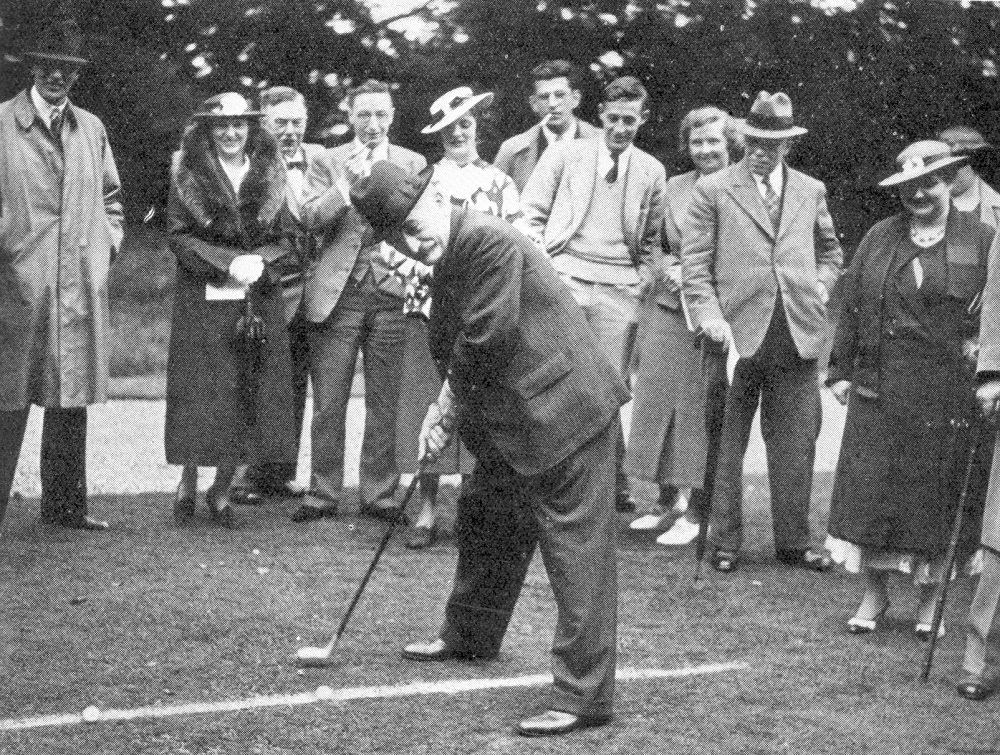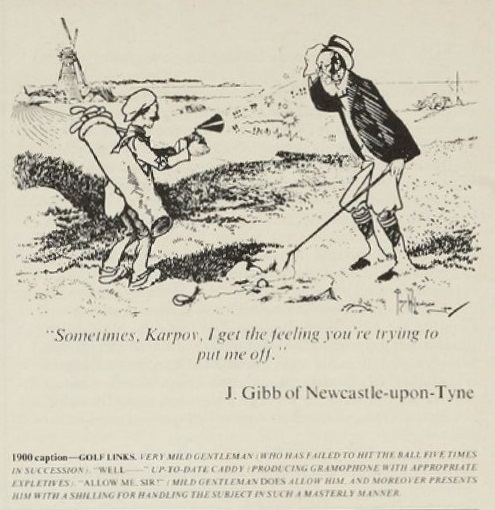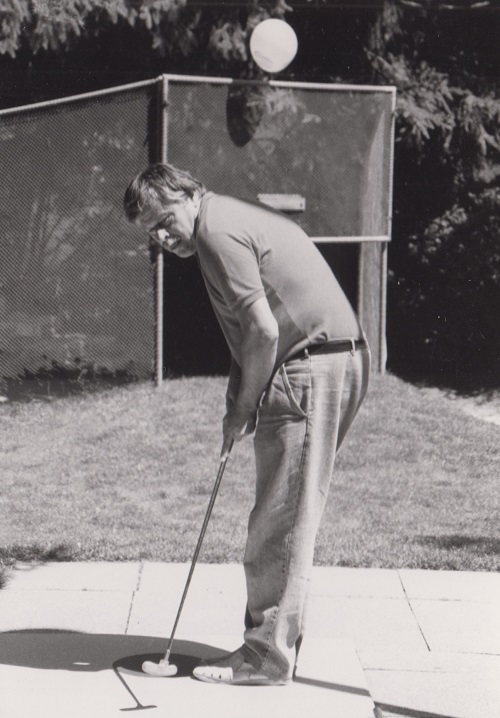
Edward Winter
We offer a few jottings on the (rare) connections between the games of chess and golf. First, there is a well-known photograph of Emanuel Lasker in action at Nottingham, 1936 (watched by, among others, B.H. Wood and Vera Menchik):

See Nottingham, 1936.
The following passage about Capablanca by William L. Hughes of Cleveland comes from page 77 of the May-June 1926 American Chess Bulletin:
‘He also had a peep at the mysteries of golf, and while not yet an “addict” it is my opinion that he will shortly succumb to the lure of this fascinating sport. He is fond of tennis and gave Mr Elliott E. Stearns a lesson in this game. Also there is just about as much chance of winning from him at auction bridge as there is at chess.’
Then there is Purdy’s well-known quote ‘Pawn endings are to chess what putting is to golf’, often repeated (e.g. on page 280 of Chernev’s The Chess Companion) without any source being specified. We therefore point out that the following appeared on page 71 of Guide to Good Chess by C.J.S. Purdy (Sydney, 1950):
‘Pawn endings are to chess what putting is to golf, with the big difference that they do not occur in every game. They occur just often enough to make them well worth while studying, and they have a fascination all their own.’
(3474)
From The Facts about Larry Evans:
Evans had a habit of lifting other writers’ bons mots and prose for presentation as his own. For example, on page 71 of Guide to Good Chess (Sydney, 1950) C.J.S. Purdy wrote:
‘Pawn endings are to chess what putting is to golf, with the big difference that they do not occur in every game.’
Two misappropriations:
‘Endgames are to chess what putting is to golf.’
L. Evans, on page 270 of Chess Life & Review, May 1970.
‘Pawn endings are to chess what putting is to golf.’
L. Evans, on page 29 of Evans on Chess (New York, 1974).
On 28 November 1986 Sidney Bernstein provided information about the murder committed by Raymond Weinstein (text given in C.N. 1311):
‘I have it on most reliable authority (the author John Collins, who was a close friend of Raymond Weinstein) that Weinstein (an extremely strong and promising young player who finished third in the 1960-61 US Championship) had been confined to a mental institution. While on temporary leave, he was rooming with an older man who made derogatory remarks about Weinstein’s mother. Raymond slit the man’s throat with a razor, and was, of course, incarcerated permanently. Raymond’s mother is also in an asylum.
Incidentally, Raymond once invited me to lunch at his home (before the above troubles, of course). His father, who was also present, struck me as a terrible person who tyrannized and terrorized the family. He was a good chessplayer, but talked incessantly about the golf trophies he had won. In retrospect, it was easy to understand why Raymond and his mother were committed.’
The heading to our feature article on Sir John Simon:
‘His pleasures were essentially middle-class – golf, chess, dancing, theatre and, like Samuel Hoare, skating.’ (David Dutton)
Regarding Mr Blackburne’s Games at Chess (London, 1899) an endnote on page 264 of Chess Explorations reported that page 428 of Who Was Who 1916-1928 had an entry on the book’s compiler, P[eter] Anderson Graham (died 25 October 1925), a prolific author and sometime editor of Country Life. His recreations were listed as chess, billiards and golf.
(3786)
Page 61 of Errol Flynn in Northampton by Gerry Connelly (Corby, 1995) reported:
‘Flynn might not have been an Einstein or a Socrates, but he always took intelligent approaches to his film rôles, played chess well, could converse in a number of exotic languages, and worked productively as a writer.’
Flynn himself took lightly the claims made on his behalf. In an article entitled ‘My Plea for Privacy’ published in Screen Guide in 1937 he wrote:
‘As to my private life – well, there’s precious little of it left – but according to what I read in the newspapers, I am a master of such minor arts as boxing, fencing, wrestling, jiu-jitsu, horsemanship, hunting, fishing, sailing, swimming, golf, tennis, chess, trap-shooting and jacks. I get up early in the morning and after dashing through Beethoven’s Etude in B Minor I casually practise each and every one of the above sports, sometimes doing a little Indian club work with my disengaged hand.’
(Kingpin, 1998)
For more about Errol Flynn see Chess and Hollywood.
As noted in C.N.s 6714 and 6715, page 30 of the Observer, 31 October 1937 had the results of a competition entitled ‘Views on Chess’:
‘The most unexpected entry is that of E.G., who won the British Chess Magazine Correspondence Tournament 25 years ago and gives “as the result of a generation of reflection”, the verdict that “Chess Mastery is the supreme example of concentrated mental power exercised on insatiable futility”.
Another contribution was:
“A good talk spoiled.” (R.P.)
The description of chess as ‘a good talk spoiled’ is reminiscent of the observation attributed (though apparently no more than that) to Mark Twain: ‘Golf is a good walk spoiled.’ See page 782 of The Yale Book of Quotations by Fred R. Shapiro (New Haven and London, 2006).
(7148)
There is also an excellent Quote Investigator page on the golf remark.

Punch, 16-22 August 1978, page 66.
(9124)
From our collection:

Vlastimil Hort
(9517)
An article on page 2A of the Brooklyn Daily Eagle, 2 June 1924 about the golfer Bobby Jones (1902-71):

(11721)
From Clive James and Chess:
‘Golf is the only sport that has snooker beaten as a television event. Mediocre golf is like mediocre anything else, but top-level golf is like chess in Cinerama ...’
Source: The Observer (Review section), 22 June 1980, page 48.
To the Archives
for other feature articles.
Copyright Edward Winter. All rights reserved.